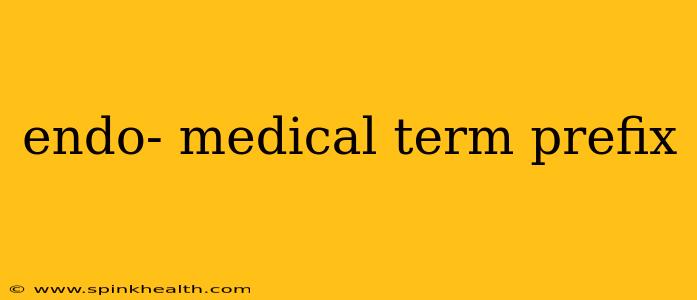The word "endo-" might sound like something from a science fiction novel, but it's actually a common medical prefix with a very specific meaning. It's a journey into the inner workings of the body, a fascinating exploration of our internal structures and processes. Let's unravel the mysteries of this prefix and understand its significance in medical terminology.
My name is Dr. Evelyn Reed, and I've been a practicing physician for over 15 years, specializing in gastroenterology. Understanding medical prefixes and suffixes is crucial for accurate diagnosis and treatment, and I'm thrilled to share my expertise with you.
What Does Endo- Mean in Medical Terms?
Simply put, the prefix "endo-" means "within," "inner," or "inside." It refers to something located inside an organ, cavity, or structure. Imagine a tiny explorer venturing into the heart of something; that's the essence of "endo-." This prefix is frequently combined with other terms to create words describing internal processes and structures within the body.
Common Medical Terms Starting with Endo-
Let's explore some common medical terms that utilize the prefix "endo-," providing a clearer picture of its application:
-
Endoscope: This is perhaps the most well-known term incorporating "endo-." An endoscope is a long, thin, flexible tube with a camera and light at the end. Doctors use it to visualize the inside of organs, such as the stomach, colon, or esophagus. Think of it as a tiny, high-tech explorer providing a visual tour of the body's interior. This minimally invasive procedure helps diagnose various conditions and allows for smaller, less invasive treatment options.
-
Endocarditis: This term refers to an inflammation of the inner lining of the heart. The "endo-" highlights that the inflammation is specifically affecting the inner layer, the endocardium. This serious condition requires prompt medical attention.
-
Endometriosis: This condition involves the growth of endometrial tissue (the lining of the uterus) outside of the uterus. The "endo-" clearly signifies the tissue's origin. Endometriosis can cause significant pain and discomfort.
-
Endocrine System: This system is responsible for regulating various bodily functions through hormones. The word "endocrine" highlights that these hormones are secreted into the bloodstream, as opposed to being released externally. The prefix aptly describes the internal nature of hormonal regulation.
-
Endodontics: This branch of dentistry focuses on the treatment of the inner part of the tooth, specifically the dental pulp. In other words, endodontics deals with root canals and other procedures that involve the inner workings of the tooth.
Frequently Asked Questions (FAQs) about the Endo- Prefix
Now, let's address some common questions surrounding the "endo-" prefix:
What are some other medical prefixes related to location?
Many prefixes describe location within the body. For instance, "epi-" means "upon" or "above," "peri-" means "around," and "hypo-" means "under" or "below." Understanding these prefixes enhances comprehension of complex medical terminology.
Are there any medical terms with "endo-" that are less common?
Yes, absolutely! Medical terminology is vast and varied. Less common examples include words like "endolymphatic" (relating to the inner ear fluid) and "endometrial" (referring to the lining of the uterus).
How can I learn more about medical prefixes and suffixes?
There are many excellent resources available, including medical dictionaries, online courses, and textbooks specifically dedicated to medical terminology. Regular study and practice are key to mastering this crucial aspect of medical understanding.
What are the implications of misinterpreting the "endo-" prefix?
Misinterpreting prefixes can lead to miscommunication and potentially incorrect diagnoses and treatments. Accurate interpretation of medical terminology is vital for effective healthcare.
In conclusion, the prefix "endo-" is a cornerstone of medical terminology, providing a clear and concise way to describe structures and processes within the body. By understanding its meaning and usage, we can gain a deeper appreciation of the complexity and precision of medical language, leading to a better understanding of our own health and the health of others.

